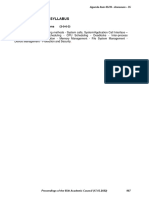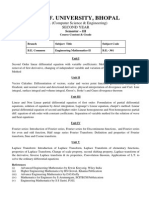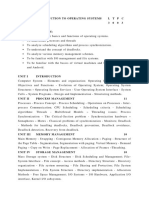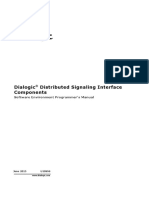CS9252
Uploaded by
R Gandhimathi RajamaniCS9252
Uploaded by
R Gandhimathi RajamaniCS 9252
OPERATING SYSTEMS
3003
UNIT IOPERATING SYSTEMS OVERVIEW
Operating system Types of Computer Systems Computer-system operation I/O structure Hardware Protection System components System calls System programs System structure Process concept Process scheduling Operations on processes Cooperating processes Interprocess communication Communication in client-server systems Multithreading models Threading issues Pthreads. UNIT II PROCESS MANAGEMENT 10
Scheduling criteria Scheduling algorithms Multiple-processor scheduling Real time scheduling Algorithm Evaluation Process Scheduling Models - The critical-section problem Synchronization hardware Semaphores Classic problems of synchronization Critical regions Monitors System model Deadlock characterization Methods for handling deadlocks Recovery from deadlock UNIT III STORAGE MANAGEMENT 9
Memory Management Swapping Contiguous memory allocation Paging Segmentation Segmentation with paging. Virtual Memory: Background Demand paging Process creation Page replacement Allocation of frames Thrashing. UNIT IV I/O SYSTEMS 9
File concept Access methods Directory structure File-system mounting Protection Directory implementation Allocation methods Free-space management Disk scheduling Disk management Swap-space management. UNIT V CASE STUDY 8
The Linux System History Design Principles Kernel Modules Process Management Scheduling Memory management File systems Input and Output Inter-process Communication Network Structure Security Windows 2000 History Design Principles System Components Environmental subsystems File system Networking. TOTAL : 45 PERIODS TEXT BOOK: Silberschatz, Galvin and Gagne, Operating System Concepts, Sixth Edition, John Wiley & Sons Inc 2003.
REFERENCES: 1. Andrew S. Tanenbaum, Modern Operating Systems, Second Edition, Addison Wesley, 2001. 2. Gary Nutt, Operating Systems, Second Edition, Addison Wesley, 2003. 3. H M Deital, P J Deital and D R Choffnes, Operating Systems, Pearson Education, 2004.
You might also like
- Arul Anandar Colege (Autonomous), Karumathur - 625514 Department of Computer ScienceNo ratings yetArul Anandar Colege (Autonomous), Karumathur - 625514 Department of Computer Science1 page
- Operating Systems: Website and E-Learning SourceNo ratings yetOperating Systems: Website and E-Learning Source1 page
- Anna University: Coimbatore M.C.A (Master of Computer Applications)No ratings yetAnna University: Coimbatore M.C.A (Master of Computer Applications)9 pages
- Bcse303l Operating-Systems TH 1.0 67 Bcse303lNo ratings yetBcse303l Operating-Systems TH 1.0 67 Bcse303l3 pages
- Bcse303l Operating-Systems TH 1.0 70 Bcse303lNo ratings yetBcse303l Operating-Systems TH 1.0 70 Bcse303l2 pages
- Adina Institute of Science & Technology Department of Computer Science & Engineering Lecture PlanNo ratings yetAdina Institute of Science & Technology Department of Computer Science & Engineering Lecture Plan3 pages
- Dos - Distributed Operating System: Unit INo ratings yetDos - Distributed Operating System: Unit I1 page
- Operating Systems: Credits: 4 Credits Course Coordinator: V.V.SubrahmanyamNo ratings yetOperating Systems: Credits: 4 Credits Course Coordinator: V.V.Subrahmanyam4 pages
- St. Peter's University: 2008 Scheme of ExaminationsNo ratings yetSt. Peter's University: 2008 Scheme of Examinations50 pages
- Rcs401: Operating Systems Unit I: ReferencesNo ratings yetRcs401: Operating Systems Unit I: References1 page
- Operating Systems Theory Course Plan (Minors)No ratings yetOperating Systems Theory Course Plan (Minors)4 pages
- Operating Systems: Concepts to Save Money, Time, and FrustrationFrom EverandOperating Systems: Concepts to Save Money, Time, and FrustrationNo ratings yet
- Mastering the Art of Unix Programming: Unraveling the Secrets of Expert-Level ProgrammingFrom EverandMastering the Art of Unix Programming: Unraveling the Secrets of Expert-Level ProgrammingNo ratings yet
- Mastering the Art of Linux Kernel Programming: Unraveling the Secrets of Expert-Level ProgrammingFrom EverandMastering the Art of Linux Kernel Programming: Unraveling the Secrets of Expert-Level ProgrammingNo ratings yet
- Computer Science: The Complete Guide to Principles and InformaticsFrom EverandComputer Science: The Complete Guide to Principles and InformaticsNo ratings yet
- 14-10-13 PGP-MC1-S-04 (Persuasion, ES) - HandoutNo ratings yet14-10-13 PGP-MC1-S-04 (Persuasion, ES) - Handout57 pages
- Automated Scoring System For Essays: AbstractNo ratings yetAutomated Scoring System For Essays: Abstract8 pages
- Automated Scoring System For Essays: SummaryNo ratings yetAutomated Scoring System For Essays: Summary4 pages
- Simovert Masterdrives: TOP Usability For Novices and ProfessionalsNo ratings yetSimovert Masterdrives: TOP Usability For Novices and Professionals2 pages
- ASK-300 Printer Driver Software For WindowsNo ratings yetASK-300 Printer Driver Software For Windows32 pages
- National University of Science and TechnologyNo ratings yetNational University of Science and Technology11 pages
- Dialogic Distributed Signaling Interface ComponentsNo ratings yetDialogic Distributed Signaling Interface Components235 pages
- HA System Software Installation Guide (Solaris) - (V100R002C01 - 06)No ratings yetHA System Software Installation Guide (Solaris) - (V100R002C01 - 06)289 pages
- QlikView Governance Dashboard 1.0 SR1 Release NotesNo ratings yetQlikView Governance Dashboard 1.0 SR1 Release Notes6 pages
- BIOSTAR H61MGC Intel H61 Motherboard BIOS ManualNo ratings yetBIOSTAR H61MGC Intel H61 Motherboard BIOS Manual31 pages
- Dr. Apj Abdul Kalam Govt. College: E-Tender NoticeNo ratings yetDr. Apj Abdul Kalam Govt. College: E-Tender Notice6 pages
- Siemens Simatic Wincc Flexible 2008 Security Hardening GuideNo ratings yetSiemens Simatic Wincc Flexible 2008 Security Hardening Guide29 pages
- Final Model Paper Computer Science SSC-INo ratings yetFinal Model Paper Computer Science SSC-I8 pages
- Laboratory 04 - Data Types and ExpressionsNo ratings yetLaboratory 04 - Data Types and Expressions4 pages




































































































